Everything in life happens for a reason. Things work out in ways that we would not have necessarily imagined, but that at some point make sense. Sometimes this can be especially difficult to recognize during those most trying moments of our lives. And as challenging as this concept may be to rationalize, one would have to suppose that if it is tough for you and me, then it must be even more challenging for a hockey goaltender. Goalies already bear a great deal of weight upon the shoulders by the sheer nature of their craft. Throw the everyday plot twists and turns of life into the mix – on top of stopping pucks – and it can add up to being more than one’s far share.
When things get to be too much, sometimes unexpected solace falls right into our laps. Before we know it, our ship has been righted.
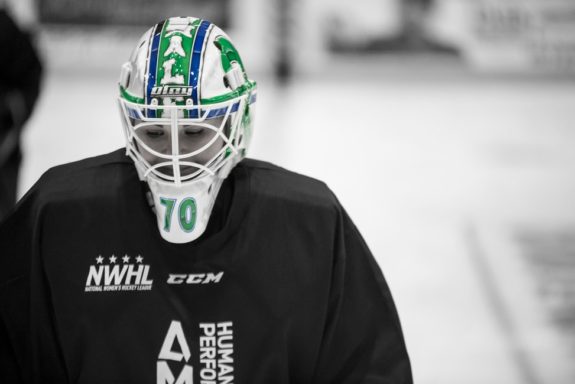
Former Connecticut Whale goaltender Sam Walther has a lot on her platter these days, but make no mistake – she is exactly where she belongs in life right now. Serving as an assistant coach for a women’s college hockey team, a recent engagement, getting her master’s degree, and being an an ambassador for the mental health of goalies everywhere. Yes, Walther is right where she was meant to be.
Coaching College Hockey in Massachusetts
Walther was a goaltender for the Connecticut Whale through the team’s first 10 games of the 2018-19 NWHL regular season. It was a no-brainer for the Whale to give the Maryland native a shot after a stellar career playing NCAA Division III hockey for Hamilton College. Walther’s 26 career shutouts and .948 save-percentage with the Continentals are the second-best totals in NCAA Division III history.
While a professional playing career seemed imminent regardless, Walther weighed all of her options after graduating from Hamilton following the 2017-18 season. Not exactly sure where she might be playing, coaching crossed her mind for the first time shortly after NWHL Free Agency opened up on Jun. 1, 2018.
“I actually didn’t have it set in my head that I wanted to coach after college, at first,” Walther explained to THW. “It honestly kind of fell in my lap. I was actually at (Whale teammate) Sarah Hughson’s house, and we were doing some last minute training before we headed up to Buffalo for their free agent camp. We’re sitting on the couch, and I thought – ‘Why don’t I look into coaching opportunities? Let’s see what’s open.’ I reached out to Mike O’Grady, who is the Nichols College head coach, and I think within 10 minutes I had an email back from him saying ‘Give me a call’. He essentially offered me the job on the phone that day. It really did fall in my lap that quickly.”
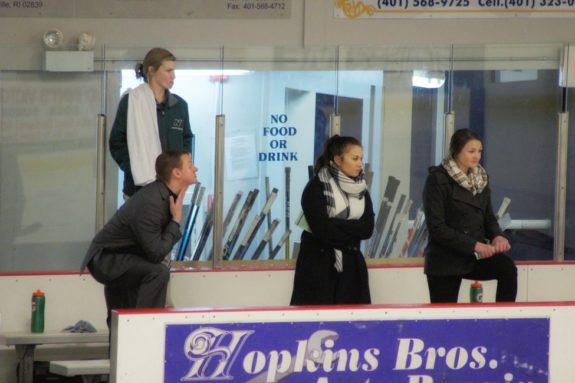
Nichols is a private college located in Dudley, Massachusetts. The Bisons play in the Colonial Hockey Conference of the NCAA along with six other schools. While Walther is in her first season with the team, O’Grady and fellow assistant coach Nicole Renault are in their second season with the program. The season before O’Grady came to the helm, the Bisons went 1-22. Through the first 20 games of the 2018-19 season, Nichols is 10-7-3 and is at the top of the Colonial standings.
Finding Academic and Career Opportunities
“Coaching-wise, it’s been great,” Walther stated. “I love being around the game and the players. They’re truly one of a kind. They’re just so fun to be around, and honestly they’re a group that it’s fun to see them grow even just this season… Not only are our girls starting to win these games, but you can just see it in them that they believe that they can win. They go out with that fire and energy. I’m sure it’s great for the two coaches that have been here for two seasons to see that, and I’m just happy to be part of the game still. I’m just as motivated to win games in our conference as if I was on the ice.”
Not only has coaching for Nichols allowed Walther to be part of a turnaround team that is finding success, it keeps her close to the game that she loves. On top of all that, accepting the position at Nichols has helped blossom other opportunities for both schooling and advocacy.
Sam Walther '18 gets nice write-up after attending @BuffaloBeauts training camp:
“A recent graduate of Hamilton College, [Walther] assembled some truly astounding numbers for the Continentals. ” https://t.co/XgOrksRN0g pic.twitter.com/pSP0ASsBQS
— Hamilton College (@HamiltonCollege) June 11, 2018
“(Coach O’Grady) explained not only the coaching position when I was hired,” Walther recalled, “but that there was also an opportunity with the Institute for Women’s Leadership on campus. It’s a student office, so I’m a graduate assistant there – I’m the program coordinator. They’re paying for my master’s, which is great. Between being able to stay in hockey, a job that’s giving me experience and some kind of activism rights and that type of work, as well as getting my master’s – it sold me right away. It’s the perfect fit.”
Walther’s degree will be a Masters of Science in Counterterrorism. In addition to her hockey skills, she has developed a knack for languages and an ability to communicate with other cultures. Walther speaks some Arabic, American Sign Language and French.
Growth of the NWHL and Women’s Hockey
Walther was one of four goalies to have been a member of the Whale during the 2018-19 season. Though she may no longer be on the team, she still has strong convictions about the betterment and growth of the NWHL and for women’s hockey in general. Walther is a thinker, and you can tell that she is not only very astute but is very contemplative by nature. Having been a part of the NWHL and the Whale, she sees that great opportunities lie all around the women’s hockey circuit.
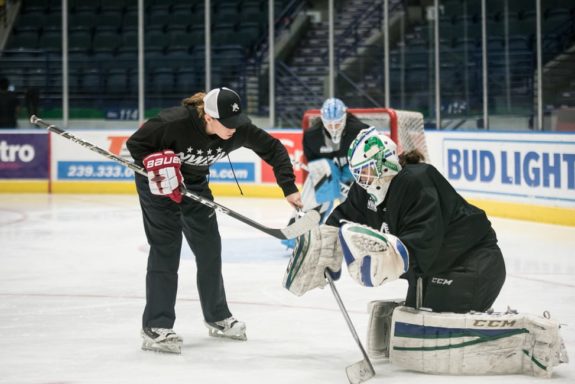
“The league has taken great steps as we’ve seen just this season alone,” Walther said about the NWHL. “I really am proud to say that I got to be a part of it. For me, I get to say that I made it because I achieved my goals. I loved being in the league, and I’m proud to say that I was a part of it. As far as the league itself growing and progressing, I think the league’s going to expand to new markets. I know those conversations have already been taking place this season and last season. I think that’s one of the best steps in the right direction. We played our game in Pittsburgh against the Rivs. I played for Pittsburgh Elite, and I can tell you firsthand that is a hockey town, and they would love to have a women’s pro team. I think it would be a great market, and there’s others out there.”
What to Do With the Connecticut Whale?
What would help the Whale in particular? First and foremost would be partnership. The Whale are the only one of the five NWHL teams not to be affiliated or owned by an NHL franchise. And while women’s hockey does certainly grow of its own accord, continued solidarity between both male and female leagues can help accentuate the speed at which women’s hockey is becoming popularized and celebrated. For proponents of women’s hockey like Walther, we want and need for the game to grow and permeate elsewhere.
“Even if it’s not an NHL partnership,” Walther said. “Even AHL, ECHL – that kind of affiliation is not just about the monetary support. I think having those established affiliations for those programs that are already there. It also just helps spread the word to people who might not normally come to a women’s pro game, that these teams exist and they’re great athletes. Just encourage new crowds to buy tickets, and especially those with young daughters. I think that’s a really important aspect – just to have other affiliations to get the word out that this is happening, this is growing, and that this is taking really great steps.”
Walther has had open discussions with her former Whale teammates regarding the notion of an affiliation with the AHL’s Bridgeport Sound Tigers and what benefits such a partnership could offer. Bridgeport has been around since 2001 and has been the longtime affiliate of the New York Islanders. The Whale’s current home is in Stamford, Connecticut. Bridgeport is less than 30 minutes away. Partnering the Whale with either the Sound Tigers and/or the Islanders could make sense.
Walther Is Helping to ‘Lift the Mask’
In addition to her coaching, schooling and playing professionally, Walther may have found her most important calling yet by becoming involved with The Goalie Guild’s “Lift the Mask” initiative. The purpose of this particular initiative is to provide goalies of all ages with a platform for getting the mental illness support that they need. This is done so by providing fellow goalies with someone to talk to, assistance with garnering professional help, and an opportunity to share one’s story. Walther actually became aware of “Lift the Mask” through another female ambassador and former NWHL goalie as well.
“I actually saw that Kelsey Neumann, a former Buffalo goalie had posted about her ambassadorship on Twitter,” Walther explained. “She was just spreading the word that this is a new kind of program available for goaltenders who may be struggling with whatever it is. I followed her tweet through, and I was looking on their website. I knew that it was something that I wanted to be a part of. I’ve struggled with personal things that have effected hockey throughout my career. I think being a goalie in particular, you have certain stressors, you have certain anxieties, and pressure that other players might not feel.”
https://twitter.com/sam_walther40/status/1047248052946386944
Walther speaks from experience. Like all of the “Lift the Mask” ambassadors, she has had her own struggles with mental health. Many goalies – like anyone else who may be suffering or struggling – need support and help from others. The trouble is that reaching out for help is very difficult conversation. Not only do goalies wear a literal mask, but their figurative one is oftentimes even more difficult to take off.
“Speaking from my experience,” Walther shared, “I remember the first time that I told my mom during high school that I thought I was depressed. I was at boarding school, I was 14, I was in a new environment, I was struggling. That was the hardest conversation I’ve ever had to start because it’s my mom – I don’t want her to think I’m struggling. I was nervous. But that single conversation truly changed my life because I was now comfortable with talking about it. I realize it’s okay, it’s normal, it happens to pretty much everyone. 80-percent of people deal with something like depression throughout their lives.”
Doing What We Can to Help Others
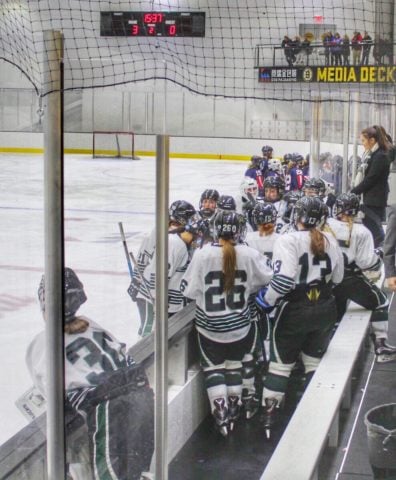
The Goalie Guild is a registered 501-(c)(3) nonprofit foundation, which means that they can accept donations and sponsorship in order to better help goaltenders who are in need through “Lift the Mask”. Right now they are able to offer up to $100 USD to help remove any financial barriers that a goalie may encounter when they make this initial consultation, chat, or visit with a professional. The Goalie Guild is committed to connecting goalies with trained mental health providers through the ADAA’s public listings.
The Goalie Guild’s approach is seeking to breakdown old-fashioned stereotypes about netminders. When she spoke with THW, Walther shared a quote from founder Justin Goldman that she felt perfectly summed up a major part of what “Lift the Mask” is all about.
Walther read aloud, “Goalies still have to fight this outdated stigma of being labeled as weird or strange by others. Many hockey coaches and parents lack a solid understanding of what goalies truly go through, so instead of getting the help we need we’re often left to our own devices or expected to figure it out on our own. This is not only unrealistic, it’s oftentimes unhealthy.”
Walther is able to relate that back to herself and how it is relative to all goalies. Not everything that a netminder feels and encounters can be attributed to a textbook mental health disorder, but that does not make the pressures any less tangible or less important to address.
“‘Lift the Mask’ primarily focuses on mental health support for goaltenders of all ages,” she went on to say. “The reason for that is because goaltenders do face a significant more proneness to mental health issues. That’s not necessarily just diagnosable mental health disorders or issues. Simple things such as struggling with fear of letting a goal in or blaming yourself after a goal goes in. Performance anxiety. Whatever it may be. It’s a whole range of issues we’re trying to help young goalies, college goalies, and even pro goalies with. Most of the ambassadors and Justin – we’re speaking from experience with these pressures. We’re all goalies, so we’re equipped to handle the range of those pressures and whatever the issue may be.”
Mental Health Awareness in the NWHL/CWHL
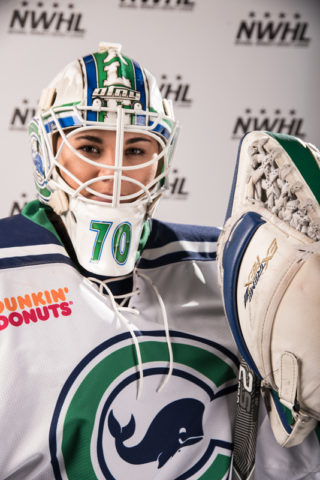
So here is the big, $100,000 dollar question: is mental heath awareness something that needs to be addressed in the NWHL and CWHL? Walther did not mince any words when offering up her response, and she backed it up with facts and numbers.
“Absolutely,” she answered adamantly. “Hands down. A lot of the stuff that “Lift the Mask” puts out is based on research. It is found through studies that female athletes are at a greater risk than males for presenting with depressive symptoms. And that’s not the only difference. Females in particular are at greater risk for these types of issues. Struggling with mental health issues. 30-percent of college female athletes struggle with a diagnosable mental health issue, and that’s only the ones that open up about it. That’s thousands of young athletes who don’t reach out. When you think about the makeup of the NWHL and the CWHL, most of these players are either right out of college or played collegiately at some point. Those performance anxieties, the stresses of the game, whatever personal mental health issues that they’re going through – they don’t just go away. I would absolutely say that there’s players out there that whatever struggles they were going through in college have been carried with them to the NWHL and CWHL. I think it’s something that would be a great step in the right direction to address.”
There are five NWHL teams in the league. Looking over the rosters and adding up the numbers, there are 112 players listed among the teams. All of them played college hockey. Could some of them be dealing with mental health concerns? Simple math would indicate yes. This is important and something that Walther is passionate about bringing attention to.
“I truly believe in finding real solutions,” Walther said firmly, “and not just saying ‘yeah, it would be a great thing’. One of the solutions – with the physicals and the team doctors – is that mental health resources need to be available to teams and players. I think it’s something that the NHL, NWHL, and CWHL should make a better point of – partnering with sports psychologists as well as psychiatrists to offer those services to players. If they’re there and players know they’re there, they are going to be more likely to use them.”
Next Steps for Walther
Sam Walther’s professional playing career does not appear to be over just yet. Since leaving the Whale, she has been skating on the ice for practices with the CWHL’s Worcester Blades. The Blades have eight regular season games remaining in the 2018-19 season, and it would serve them well to sign a netminder of Walther’s pedigree.
While joining Worcester could very well be the next step for her professional career, Walther is fully enamored with continuing her work coaching for Nichols. Furthermore, she has strong intentions for how she will proceed when it comes to The Goalie Guild and “Lift the Mask”.
Walther shared, “My next step with “Lift the Mask” needs to be starting conversations outside of just my college roster. I’d really like to branch out and be a resource. Even if it’s the high school team around here or the youth teams. Being a goalie coach and being out there, and helping their coaches.”
Women's Hockey: Sam Walther '18 is the 1st two-time All-American in @HCwomenshockey history!! #BackOurBlue pic.twitter.com/nsgOB6LYH7
— Hamilton College Athletics (@HamCollSports) March 17, 2018
Her intentions are not limited either. Mental health in hockey can be addressed in all avenues and facets. Should Walther indeed move onto the CWHL, she can function as a beacon there as well. She has a message for her fellow professional players, and it is one that needs to ring loud and clear.
“For current players, I think my message is simple – talk about it!,” Walther said clearly. “Whether it’s with trusting teammates, family, friends outside of hockey – just talk about it. I truly believe that, and I know it’s hard. I’ve been there, and it’s the hardest conversation to start, but it’s truly a weight off your shoulders to talk about whatever you’re going through. Those conversations are hard to start, but it not only takes a weight off that person’s shoulders, but I think people will really find that not only will people understand what you’re going through but they can probably relate really well and offer a helping hand.”